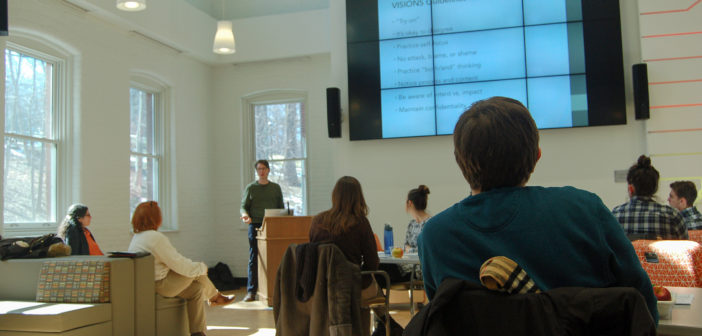Though the statement “check your privilege” is often perceived as a negative statement, gaining awareness of one’s privilege can be significant to understanding others.
On Feb. 17, the Council for Equitable Community hosted a Tackling Tough Topics Together discussion in the Global Commons about privilege and hardship and how they affect everyone’s lives differently.
Sam Evers, ’19, said privilege is generally hard to talk about because society has given it a negative connotation.
“Privilege is a neutral thing intrinsically,” Evers said. “Sometimes our culture treats it as an accusation.”
Aarsenio Perry, the assistant director of the Student Activities Office, said sometimes when people talk about privilege, they assume they are being told they have it easy or they don’t work hard.
“That is the total opposite of what privilege means,” Perry said. “Recognizing that one has privilege is a great thing.”
Perry said privilege is an unearned advantage granted to an individual or group of people that grants them more of an opportunity than another group of people.
A large part of the discussion was giving privilege a definition. It began with a video about a pair of best friends, a snail and caterpillar. They were shown slipping under a fence, which came easily to the caterpillar but not for the snail, who got stuck.
At first, the caterpillar couldn’t understand why it was difficult for the snail to slip under the fence when it had been so easy for him. In the end, the snail explained it was not either of their faults that she had a shell, and they should work together to find a different way to keep moving. Students, faculty and staff then broke into small groups to discuss how privilege was portrayed through the metaphor of the snail and caterpillar.
Rabbi Danielle Stillman, a member of the CEC, said privilege is important to talk about because it is an underlying component of all the topics the council wants to discuss.
“Whether it’s race or politics or safe brave spaces,” Stillman said, “almost any topic that you can think of, it is helpful to have some basic understanding of what privilege is and be aware of your own orientation in privilege.”
Stillman said she knows privilege can be a difficult topic to talk about, but because it is encompassing of other tough topics, the CEC thought it should be discussed at the beginning of the semester. Stillman said students are often scared of saying the wrong thing, but when they can talk in a welcoming, facilitated space, they may be more likely to share something the next time the topic comes up.
Angela Scott Ferencin, the chair of the education and dialogue committee of the CEC, said the discussions aim to educate, empower and inspire Lehigh’s community to be passionate about diversity and inclusion.
“There are so many wonderfully diverse and unique opportunities to learn outside of the classroom,” Ferencin said. “We all on Lehigh’s campus need to think about the fact that there are opportunities outside the classroom for us to learn, for us to grow, for us to question what’s going on and what’s not going on in our society.”
Perry said the first step toward inclusion and understanding privilege is being open and willing to hear someone else’s experience. Perry said talking about difficult subjects gives students the confidence and knowledge to take action. He said if students join clubs and organizations and go to lectures and events that are different than those they normally attend, they will gain a greater understanding of people who are different.
“The more we can have conversations, the more we can read about some of these things, the more we are aware of other people and otherness in our world, the more we will be able to acknowledge privilege,” Perry said. “For us to be able to see ourselves in each human, that’s the only way I think we’re going to be able to build bridges, to fix gaps, to advocate for each other, to want everyone to have a great life.”






Comment policy
Comments posted to The Brown and White website are reviewed by a moderator before being approved. Incendiary speech or harassing language, including comments targeted at individuals, may be deemed unacceptable and not published. Spam and other soliciting will also be declined.
The Brown and White also reserves the right to not publish entirely anonymous comments.